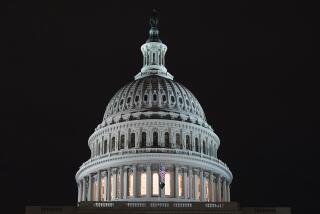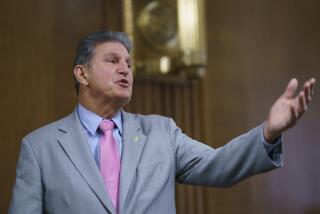Japanese Investors Unmoved by U.S. Deficit Cut
- Share via
NEW YORK — Big Japanese investors here say that Washington has not done enough to reduce the federal budget deficit and that Friday’s agreement in Washington won’t bring them back to Wall Street in force.
“I have no intention to start buying, as the stock market is forecast to decline further technically,” said Nobuhiko Higo, fund manager at Sumitomo Life Insurance Co. in New York.
Japanese investors have taken to the sidelines since Wall Street suffered its record crash on Oct. 19, when the Dow Jones industrial average lost a historic 508 points.
Eiji Ono, manager of Chuo Trust & Banking Co., said: “It took so long to produce an unsubstantial reduction.”
The agreement reached Friday between the White House and Congress calls for a two-year reduction of $76 billion in the U.S. deficit through spending cuts and tax increases. The deficit, blamed for much of the instability in financial markets, was $148 billion last year.
Ono said the performance of the Reagan Administration during the budget talks had left a negative impression with Japanese investors.
Hiroyuki Kondo, chief dealer of treasury and foreign exchange at Yasuda Trust & Banking Co., said it is obvious that the United States cannot increase taxes substantially ahead of the presidential election next year.
President Reagan said the budget agreement would raise about $9 billion in new revenue but would not include an increase in income taxes.
“A fundamental solution to the deficit cut has not been concluded,” Kondo said.
The Japanese investors said the recent renewal of the dollar’s weakness has prevented them from resuming active investment in any dollar-denominated instruments.
After the stock market collapse Oct. 19, Japanese investors shifted funds to U.S. Treasury bills and notes, they said. The investors did not sell U.S. stocks actively during the collapse but have remained on the sidelines since.
One fund manager at a large Japanese insurer said his head office was looking to sell U.S. stocks.
But Higo, of Sumitomo Life, said his Tokyo head office has no plan to substantially cut U.S. stock holdings as they are long-term investment.
However, he said Sumitomo Life’s New York-controlled fund had reduced U.S. stocks and shifted the proceeds to Treasury securities.
Due to the uncertain direction of the dollar, new cash in foreign portfolios will head to financial instruments in British pounds and West German marks, and the percentage of dollar assets will decline, Higo said.
Keiji Tsuda at Nissei BOT Asset Management Corp. in New York, said the deficit-reduction agreement is constructive to financial markets, wiping out monthlong uncertainties.
But Tsuda, the senior adviser to Japan’s largest life insurer, Nippon Life Insurance Co., said the budget accord does not give a sign to resume investment in U.S. stocks. The stock market is expected to fall further and stop above the 1,738 seen at the close on Oct. 19, he said.
“It is hard to predict a timing of a market upturn” and when Japanese investors will return to U.S. stocks, Tsuda said.
More to Read
Inside the business of entertainment
The Wide Shot brings you news, analysis and insights on everything from streaming wars to production — and what it all means for the future.
You may occasionally receive promotional content from the Los Angeles Times.









